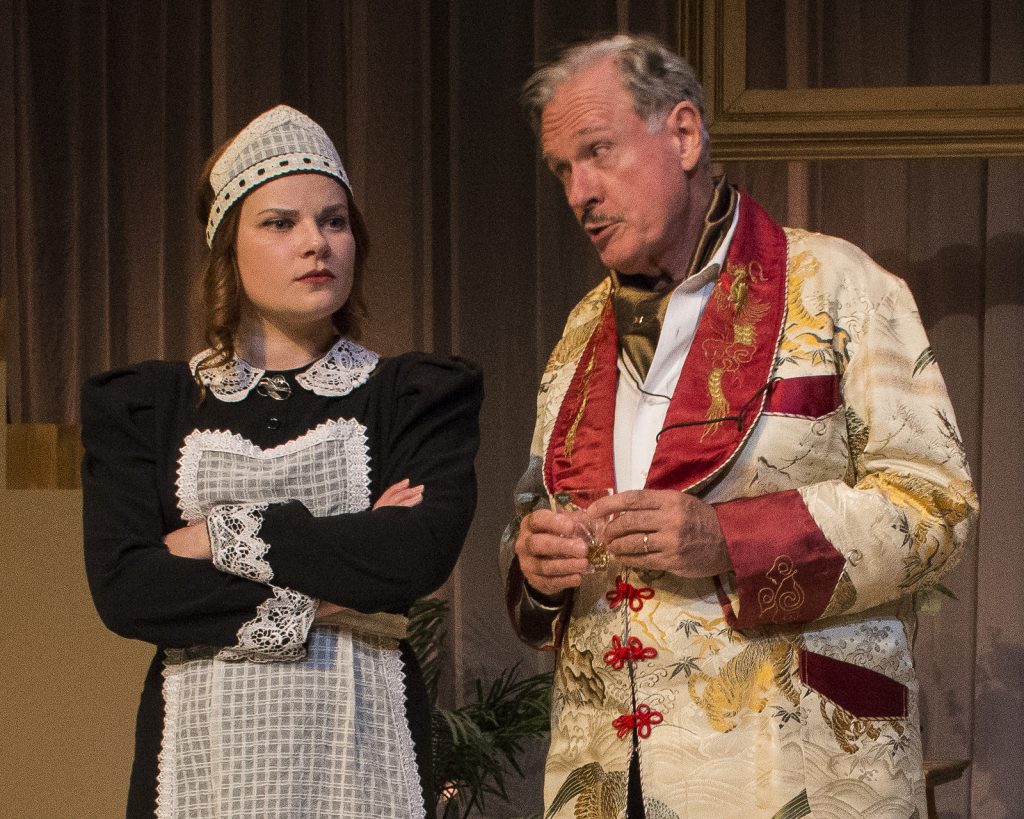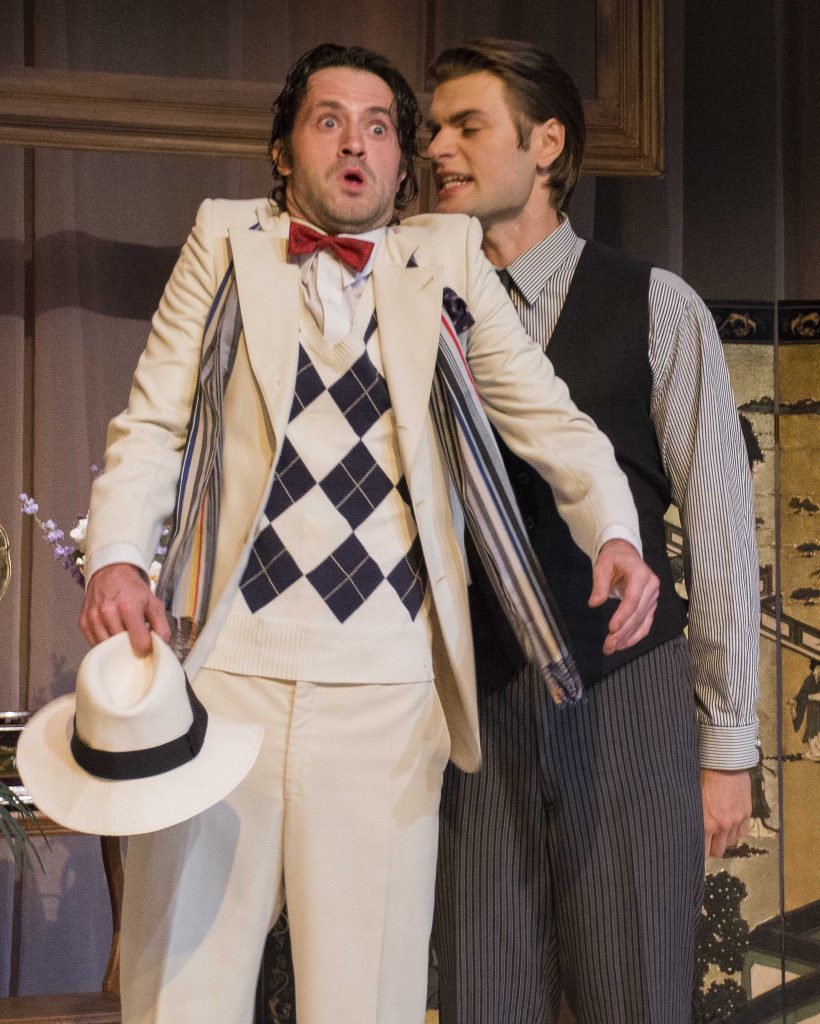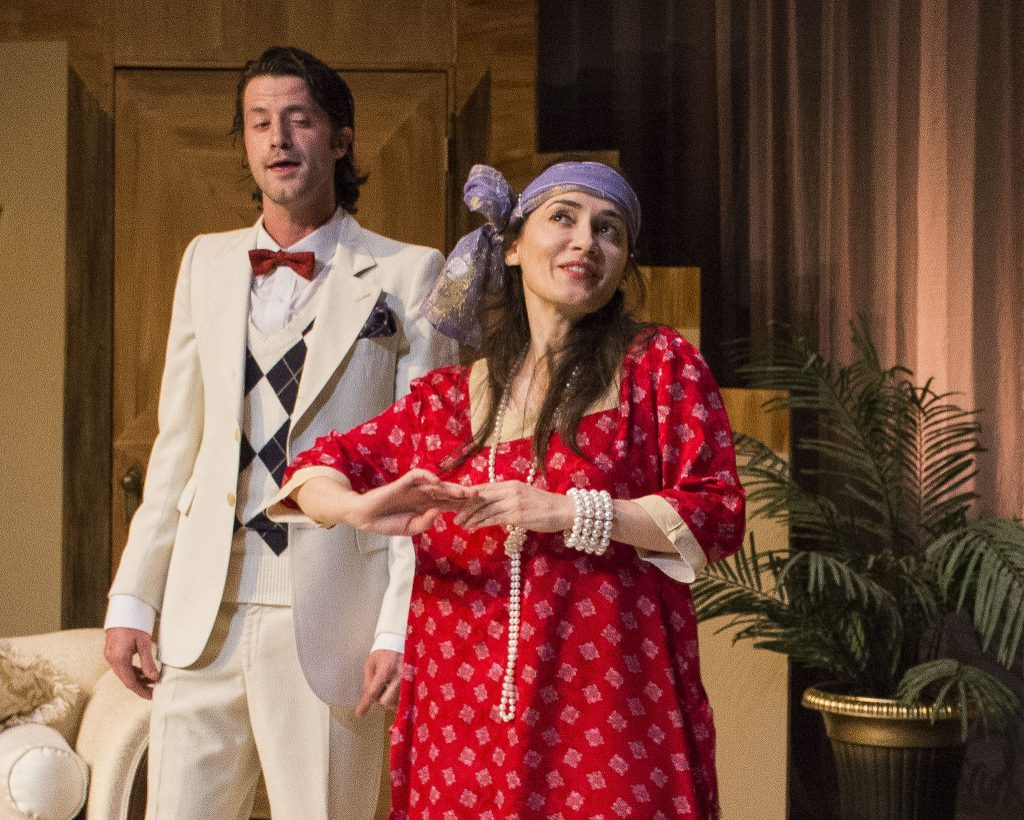
Credit: Nancy Caldwell
At Jericho Arts Centre until June 25, 2017
604-224-8007/unitedplayers.com
Posted June 4, 2017
Shakespeare was not the first nor will he be the last to use mistaken identity as a comedic device. It’s a classic dramatic technique that keeps going and going and going. Why? Even as we scoff at it, we love it. We can’t wait for the big reveal, the moment of truth, the jaw-dropping scene when the lovers, disguised as their own servants, their own brother or the opposite sex, discover what’s really going on. And they all live happily ever after most of the time.
And so, despite some irrelevancies in our culture, like arranged marriages and marrying below one’s class, plays like Pierre de Marivaux’s The Game of Love and Chance (1730) with their witty repartee and ridiculous situations, still hold considerable charm for contemporary audiences. There’s comfort in stock characters that we recognize: the flirty maid, the cunning but clownish valet, the handsome groom-to-be, the clever bride-to-be and her brother, and the doting father. They all play their part and we know, in advance, what these parts will be but still we’re entertained. It’s all about the revelation, resolution and wedding bells.
Using a translation and adaption by Canadian Nicolas Billion, director Brian Parkinson takes the action to Quebec in the 20s. Much shorter than Marivaux’s original, it’s all over in ninety minutes without intermission – a feather-light piece of summer entertainment with pretty costumes, properties and set decoration – including huge bouquets of flowers – by Linda Begg. Sandy Margaret anchors her set design with a gorgeous ivory sofa. Lighting designer Darryl Strohan brings up rosy lights on the set and bright spotlights on the flowers, signalling affluence, good taste and elegance.
Old Orgon (Peter Robbins) has arranged a marriage between his daughter Sylvia (Elizabeth Willow) and Dorante (Callum Gunn), the son of an old friend. Sylvia, however, must agree to the marriage and she has yet to lay eyes on the man her father has chosen. Worried that she will get rushed into the union she convinces her maid Lisette (Rebecca Husain) to change places with her so she can observe her intended when he arrives.

Credit: Nancy Caldwell
Unbeknownst to Sylvia is that her father has received a letter from his old friend letting him know that Dorante has had similar concerns and will arrive concealed as Arlequino (Matt Loop), his valet. Dorante calls himself – on the spur of the moment, it seems – Bourguignon. We all know what’s going to transpire between the valet and the maid, Dorante/Bourguignon and Sylvia. And it does.
Two styles collide nicely: realism (more or less) and the buffoonery of Lisette and Arlequino, both of whom are ‘way over the top. She, the drama queen, gesticulates like a demented thespian. He, the pratfalling, not-at-all-suave suitor, struts around like the lord of the manor. Husain, as Lisette, squeals with delight, sighs with longing, squirms with desire while Loop, as Arlequino, puts on aristocratic airs that simply make the character even more ridiculous.
Gunn and Willow are well matched and make a plausible pair of lovers. Gunn exudes refinement and gentlemanliness even while pretending to be a valet and Willow maintains a quick wit and insight while feigning lower class. The look that passes between them at the moment their characters first meet, however, seals the deal: Sylvia and Dorante are meant for each other it’s just a matter of how it will all work out.
Robbins’ Orgon is decent but playful as he watches the situation evolve. We do believe if Sylvia does not want to marry Dorante, Orgon will not force the daughter he so obviously loves into a loveless marriage. Simon Garez, as Sylvia’s brother Mario, enjoys his sister’s dilemma; sometimes onside, sometimes happy to crank up the confusion.

Credit: Nancy Caldwell
Through Sylvia, Marivaux makes some harsh judgments about men and marriage; “Most wives are mistreated by their husbands”, Sylvia claims and she believes men are two-faced but the commentary is not heavy-handed nor are her father or Dorante anything but decent.
With a slight lag near the end, the action is brisk. It may be that the longed-for resolution is within the audience’s grasp and we just want to get to the happy reveal.
Presented by United Players, a non-professional company, The Game of Love and Chance has excellent production values and is entertaining. With the demise of Blackbird Theatre, whose mandate it was to produce ‘the classics’, plays like this are going to be increasingly relegated to amateur groups or theatre schools. We are fortunate to have United Players who continue to include in their season some of these old, largely forgotten plays.

